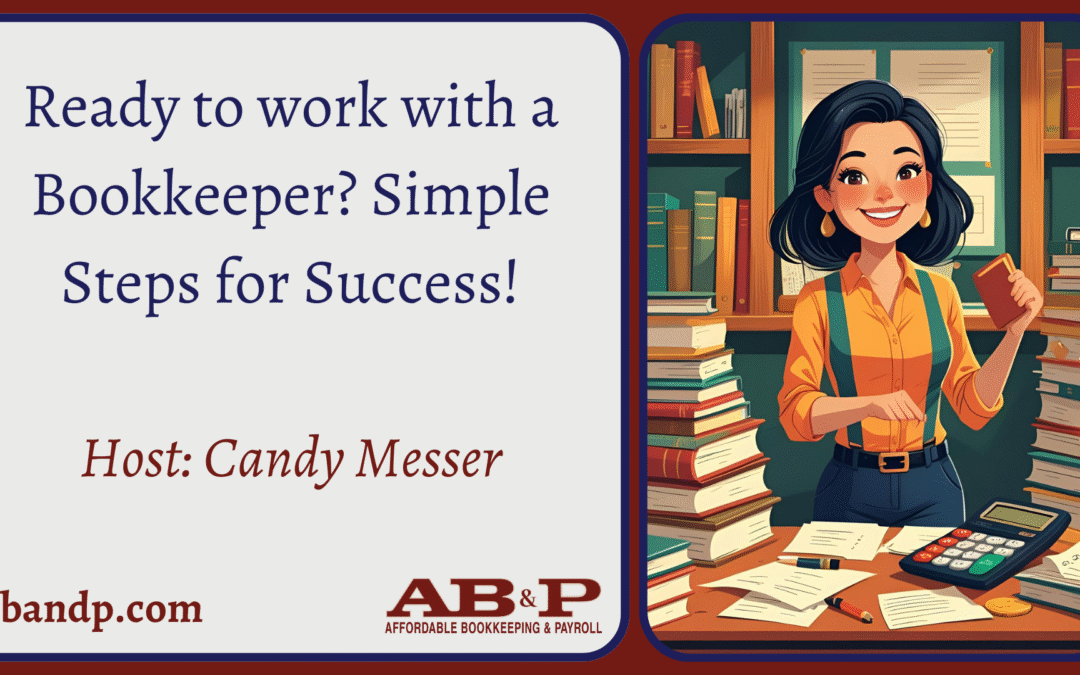Starting with a bookkeeper can feel scary. Maybe you feel you will be judged for how much money you make, or that your income is lower than what you think you need to have a professional assist you.
Perhaps you know your accounting is a mess and you don’t want anyone to see. But getting everything in order sooner than later is best.
I want to share some tips with you to help make the switch to using a bookkeeper easier.
One of the best things you can do is keep business and personal finances separate. You might think it’s easier to only have one checking account, but it’s more work to split business and personal transactions. And if you are a S Corp or LLC, this is a no-no. Open a business bank and credit card accounts, and use them only for business purposes. It’ll save you time and headaches later.
If you don’t understand the information on your financial reports, ask to have a meeting with your bookkeeper. These reports are generated to help you make wise business decisions. If you don’t comprehend the details, they won’t be useful for strategic planning.
It’s also important to have accounts reconciled timely. Provide your bookkeeper with statements (or better yet, give read-only access so they can gather the documents when they are ready). And once a period is closed, if you have access to the data file, don’t go back and change anything. Even small tweaks can throw off your records. If something needs adjusting, talk to your bookkeeper first.
Go paperless whenever possible. It’s so much easier to save your paperwork to share with your bookkeeping, CPA, or for your records. It keeps everything organized and easy to find when you need it. Hopefully, you’ll never be audited, but if you are, your proof is readily available.
If you handle cash, make sure to track it properly. Deposit it first, then spend it as this keeps a record of your financial transactions. And having a paper trail for purchases is especially true if you use personal cash to pay for business expenses. Although not recommended, it does happen. You’d hate to lose deductions because you didn’t keep receipts, so make sure these are provided to your bookkeeper too.
You’ll also want to know how your business structure affects your taxes. As a sole proprietor or partner, you can’t be on payroll. But as a shareholder in a company, you are supposed to have a portion of compensation paid through wages.. Whether you pay yourself through salary or distributions, it’s important to get it right to avoid issues. Your bookkeeper can assist you with proper payments to be in compliance with government regulations.
Choosing the right accounting software matters. Switching later can be a hassle, so let’s make sure you start with the best option for your needs now and in the future. Have a conversation about your business needs and the right option can be determined.
Your bookkeeper can also help monitor your cash flow. You don’t want to be taken by surprise when bills come due. Do your best to keep a little extra in your bank account than you think you’ll need. Unexpected expenses happen, and a buffer helps prevent last-minute stress.
Next, stay ahead of tax deadlines. No one likes surprise tax bills, so let’s make sure you know what’s coming and when. Whether you must pay payroll, sales or income tax, preparing a schedule or your required payments and the amounts due is something we can handle for you.
If you are managing your bookkeeping, but it’s too much for you to handle (or you realize you could be doing better things with your time), consider outsourcing it. Letting a professional handle the numbers frees you up to focus on growing your business.
If you are ready to have a conversation to learn if hiring a professional is right for you, reach out to us at 310-534-5577 or contact@abandp.com. My team is ready to assist you!
https://jetpackworkflow.com/blog/bookkeeping-tips-for-clients
